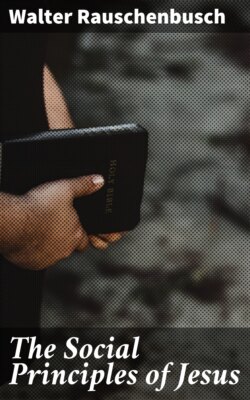Читать книгу The Social Principles of Jesus - Walter Rauschenbusch - Страница 10
На сайте Литреса книга снята с продажи.
Sixth Day: Going Beyond Justice
ОглавлениеTable of Contents
For the kingdom of heaven is like unto a man that was a householder, who went out early in the morning to hire laborers into his vineyard. And when he had agreed with the laborers for a shilling a day, he sent them into his vineyard. And he went out about the third hour, and saw others standing in the marketplace idle; and to them he said, Go ye also into the vineyard, and whatsoever is right I will give you. And they went their way. Again he went out about the sixth and the ninth hour, and did likewise. And about the eleventh hour he went out and found others standing: and he saith unto them, Why stand ye here all the day idle? They say unto him, Because no man hath hired us. He said unto them, Go ye also into the vineyard. And when even was come, the lord of the vineyard said unto his steward, Call the laborers, and pay them their hire, beginning from the last unto the first. And when they came that were hired about the eleventh hour, they received every man a shilling. And when the first came, they supposed that they would receive more; and they likewise received every man a shilling. And when they received it, they murmured against the householder, saying, These last have spent but one hour, and thou hast made them equal unto us, who have borne the burden of the day and the scorching heat. But he answered and said to one of them, Friend, I do thee no wrong: didst not thou agree with me for a shilling? Take up that which is thine, and go thy way; it is my will to give unto this last, even as unto thee. Is it not lawful for me to do what I will with mine own? or is thine eye evil, because I am good? So the last shall be first, and the first last.—Matt. 20:1–16.
Judaism rested on legality. So much obedience to the law earned so much reward, according to the contract between God and Israel. Theoretically this was just; practically it gave the inside track to the respectable and well to do, for it took leisure and money to obey the minutiæ of the Law. In [pg 007] this parable the employer rises from the level of justice to the higher plane of human fellow-feeling. These eleventh-hour men had been ready to work; they had to eat and live; he proposed to give them a living wage because he felt an inner prompting to do so. In the parable of the Prodigal Son the father does more for his son than justice required, because he was a father. Here the employer does more because he is a man. Each acted from a sense of the worth of the human life with which he was dealing. It was the same sense of worth and sacredness in Jesus which prompted him to invent these parables.
Do we find ourselves valuing people according to their utility to us, or do we have an active feeling of their human interest and worth? Let us run over in our minds our family and relatives, our professors and friends, and the people in town who serve us, and see with whom we are on a human footing.
